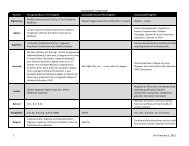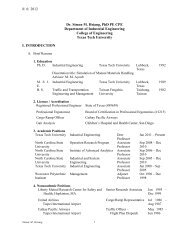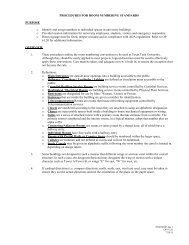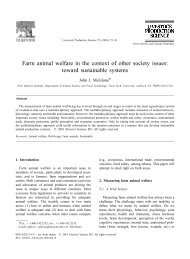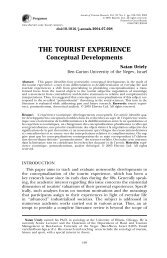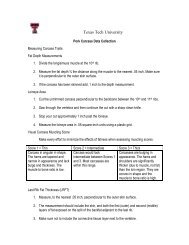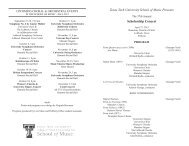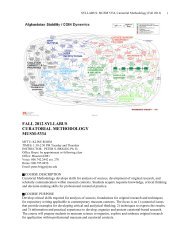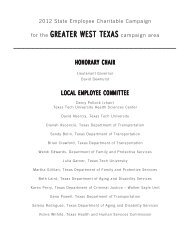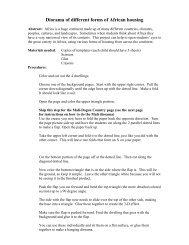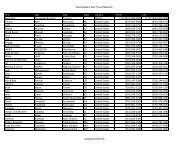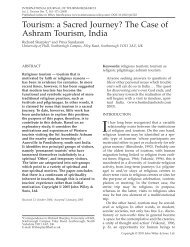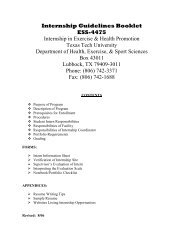Biotechnology Student Handbook - Texas Tech University
Biotechnology Student Handbook - Texas Tech University
Biotechnology Student Handbook - Texas Tech University
You also want an ePaper? Increase the reach of your titles
YUMPU automatically turns print PDFs into web optimized ePapers that Google loves.
<strong>Texas</strong> <strong>Tech</strong> <strong>University</strong><br />
MASTER’S OF SCIENCE DEGREE IN<br />
BIOTECHNOLOGY<br />
APPLIED SCIENCES TRACK<br />
<strong>Biotechnology</strong><br />
<strong>Student</strong><br />
<strong>Handbook</strong><br />
2013/2014
MESSAGE FROM THE<br />
DIRECTOR<br />
The start of any new semester is always an exciting time,<br />
not only for students but also for faculty and staff. In your case,<br />
the occasion is no doubt even more exciting, as you are beginning<br />
a completely new program in what for many of you is a<br />
completely new university (and perhaps even a new country). We<br />
are very pleased indeed, given the many choices you may have<br />
had, that you have chosen to pursue your graduate education in<br />
biotechnology at <strong>Texas</strong> <strong>Tech</strong> <strong>University</strong>. We are delighted to<br />
have you here and are dedicated to making your experience here<br />
both enjoyable and productive. We hope that you will feel free to<br />
contact us for advice or any time you encounter problems of any<br />
sort.<br />
One of the first choices you will encounter is the selection of the two elective<br />
courses called for in the first-semester curriculum. One of the features of our program of<br />
which we are very proud is the wide array of elective courses available, designed to make<br />
the program as flexible as possible and to give the students a chance to tailor the<br />
curriculum to meet their needs. Dr. Tripathy and I will be more than happy to assist you<br />
in the selection of these electives.<br />
I also want to point out that a graduate degree program is very much a two-way<br />
street and thus, no matter how hard the faculty and staff work in preparing courses and<br />
presenting material, real success cannot be achieved unless the students work hard and<br />
are equally dedicated to achieving the goals of the program. The subjects that must be<br />
mastered in order for a student to succeed in this highly competitive area are demanding<br />
and will require hard work at the highest level. However, I am confident that you will<br />
find the effort worthwhile and satisfying and that your efforts will be rewarded at the end<br />
of the program when you find yourselves well qualified for employment in the exciting<br />
and growing field of biotechnology.<br />
David B. Knaff, Ph.D.<br />
Director<br />
Center for <strong>Biotechnology</strong> and Genomics<br />
Paul W. Horn Professor<br />
Department of Chemistry and Biochemistry<br />
1
MESSAGE FROM THE<br />
GRADUATE ADVISOR<br />
Dear <strong>Student</strong>s:<br />
I welcome you to the Center for<br />
<strong>Biotechnology</strong> and Genomics. I am glad you<br />
decided to join the graduate program in<br />
<strong>Biotechnology</strong> at <strong>Texas</strong> <strong>Tech</strong> <strong>University</strong>. I am<br />
happy to help you as your graduate advisor for<br />
the next two years.<br />
Our program draws in students from diverse<br />
backgrounds creating a unique and challenging<br />
experience. Over the next two years, our goal<br />
is to provide you with the most up to date<br />
knowledge and training in the field of<br />
<strong>Biotechnology</strong>. Many of our students after<br />
graduation are working in renowned institutes and industries or furthering<br />
their studies in a doctoral program. I hope that you all will follow a similar<br />
path to success and I am here to provide guidance and support to see that<br />
your dreams do come true.<br />
Thank you for making the Master's program in the Center of <strong>Biotechnology</strong><br />
and Genomics your home. I wish each one of you good luck.<br />
If you have any questions please do not hesitate to see or contact me.<br />
Jatindra Nath Tripathy, Ph. D; M.BA.<br />
Graduate Advisor<br />
2
TABLE OF CONTENTS<br />
Contacts 4<br />
Mission Statement 5<br />
Program Overview 6<br />
General Guidelines 8<br />
First Year of Program 10<br />
Second Year of Program 11<br />
Non-Thesis Checklist 15<br />
Thesis Checklist 16<br />
Academic Calendar 17<br />
Fall Approved Electives 18<br />
Tentative Spring Electives 19<br />
<strong>University</strong> Policies 20<br />
Resources 30<br />
Advising Worksheet 31<br />
We would like to acknowledge The Department of Biological Sciences at <strong>Texas</strong> <strong>Tech</strong> <strong>University</strong> for<br />
allowing portions of their graduate student handbook to be used as a model for some of the sections<br />
contained in the <strong>Biotechnology</strong> student handbook.<br />
3
CONTACTS<br />
Director:<br />
Dr. David B. Knaff<br />
Office: Chem 416<br />
Phone: (806) 742-0288<br />
David.knaff@ttu.edu<br />
<strong>Biotechnology</strong> Master’s Program Advisor:<br />
Dr. Jatindra N. Tripathy<br />
Office: ESB 103<br />
Phone: (806) 742-3722 x229<br />
Jatindra.n.tripathy@ttu.edu<br />
Staff:<br />
Office: ESB 101<br />
Phone: (806) 742-3722<br />
Dr. Susan San Francisco<br />
Dr. Ruwanthi Wettasinghe<br />
Susan.san-francisco@ttu.edu<br />
Ruwanthi.wettasinghe@ttu.edu<br />
Ext. 225 Ext. 226<br />
Dr. Masoud Zabet-Moghaddam<br />
Beatrice Perez<br />
Masoud.zabet@ttu.edu<br />
beatrice.g.perez@ttu.edu<br />
Ext. 226 Ext. 226<br />
Dr. Rao Kottapalli<br />
Rao.kottapalli@ttu.edu<br />
Ext. 232<br />
4
MISSION STATEMENT<br />
<strong>Biotechnology</strong> and genomic research is a major focus at <strong>Texas</strong> <strong>Tech</strong> <strong>University</strong>. The<br />
Center for <strong>Biotechnology</strong> and Genomics is designed to capitalize on this strength by<br />
facilitating research partnerships between highly productive research teams that extend<br />
across departmental boundaries. These partnerships are established to bring together<br />
complementary research efforts in biochemistry, molecular biology, and genetics.<br />
The Center for <strong>Biotechnology</strong> and Genomics is an integrated component of the<br />
international biotechnology and genome research community. Strong cooperative ties<br />
have been forged with academic institutions, federal laboratories, and companies in<br />
<strong>Texas</strong> and throughout the region.<br />
The Center provides:<br />
Core Facilities that offer instrumentation, support and training in various<br />
aspects of modern biotechnology.<br />
Multidisciplinary graduate studies in <strong>Biotechnology</strong> and Genomics leading to a<br />
Master of Science degree in <strong>Biotechnology</strong> which is designed to prepare<br />
students for technical positions in the rapidly growing biotechnology industry.<br />
A joint MS/JD degree, a program in conjunction with the <strong>Texas</strong> <strong>Tech</strong> Law<br />
School<br />
Membership composed of a diverse group of faculty with multiple sources of<br />
funding from the academic campus and the HSC medical campus.<br />
5
MASTER’S OF SCIENCE DEGREE IN<br />
BIOTECHNOLOGY<br />
The master's program is a two-year program, jointly administered by the General<br />
Academic Campus and the Health Sciences Center of <strong>Texas</strong> <strong>Tech</strong> <strong>University</strong>. <strong>Student</strong>s<br />
may pursue either the Applied Sciences track (TTU) or the Bio-Medical track<br />
(TTUHSC). The Applied Sciences track is a 21 month curriculum consisting of a<br />
minimum of 22 credits in the first year, and 18-24 credit hours during the summer<br />
sessions and the second year. <strong>Student</strong>s have the flexibility to do either a thesis or nonthesis<br />
degree plan (i.e., internship or non-thesis capstone experience); however, students<br />
must register for 9 credit hours for research or internship in both the fall and spring<br />
semesters regardless of any summer hours taken.<br />
Applied Sciences Overview<br />
The Applied Sciences track, administered by the TTU General Academic Campus, is<br />
designed to prepare students for a career in biotechnology. <strong>Student</strong>s devote their first year<br />
to course work, which is comprised of a mixture of required core courses (lectures and<br />
laboratory) and selections from a broad spectrum of electives. These electives allow<br />
students to gain expertise in molecular biology, biochemistry, cell biology, animal<br />
science and plant science. There are three options for the second year of the program.<br />
For the first two options, the second year of the program involves intense (hands-on)<br />
practical training, with students choosing between an internship or thesis for the training<br />
experience. There are limited numbers of internships and research assistantships available<br />
and the number varies from year to year.<br />
These are highly competitive options with many factors determining availability of<br />
and eligibility for these positions.<br />
Option 1 involves a one-year thesis-based research experience in a laboratory<br />
at <strong>Texas</strong> <strong>Tech</strong> (or, in some cases, at the <strong>Texas</strong> <strong>Tech</strong> Health Sciences Center),<br />
where a <strong>Texas</strong> <strong>Tech</strong> faculty member with scientific expertise in a field of<br />
particular interest to the student supervises the research training. This option<br />
may take longer than one year to complete, as it depends on the completion of<br />
a research project, an oral defense of the research to a committee of 3 faculty<br />
members and submission of a written thesis.<br />
Option 2, which does not involve a written thesis, is a one-year internship.<br />
Internships are available in private-sector biotechnology companies, in nonprofit<br />
research foundation laboratories, in state and federal government<br />
research labs, or in selected university labs (including some at <strong>Texas</strong> <strong>Tech</strong>).<br />
Our faculty assists students in finding internships that are interesting and<br />
challenging. <strong>Student</strong>s can apply for, and choose any company in the U.S.<br />
current and former students have enjoyed internships in California, Missouri,<br />
Tennessee, and <strong>Texas</strong>. <strong>Student</strong>s must register for internship credit and<br />
6
successful completion is evaluated by a written description and a<br />
comprehensive oral examination (including all coursework and experience<br />
gained during the internship) by a committee of 3 faculty members.<br />
Option 3 involves neither an internship nor a research-based thesis, but<br />
instead involves additional, advanced course work during the second year,<br />
chosen in an academic area of concentration like informatics/computer<br />
science, engineering, microbiology, biochemistry or business. For example,<br />
for students interested in eventually moving into management positions in the<br />
<strong>Biotechnology</strong> industry, a variety of business courses in management and<br />
related areas are available. Planning the class schedule for this option should<br />
be carefully discussed with the Graduate Advisor as early as possible to<br />
ensure as many classes will be available for registration as possible. Success<br />
in this track will be determined by class grades and an in-depth written paper<br />
on an appropriate topic in a capstone course. As is the case for all non-thesis<br />
M.S. degrees at <strong>Texas</strong> <strong>Tech</strong>, along with a comprehensive final oral<br />
presentation of this scholarly research, an examination is required.<br />
1 st Year<br />
(Course Work)<br />
Option 1<br />
Thesis<br />
2 nd Year<br />
Non-Thesis<br />
Option 2 Option 3<br />
Lab at TTU<br />
system<br />
Internship<br />
Capstone<br />
Lab at TTU<br />
system<br />
Lab at<br />
another<br />
academic<br />
institution<br />
Industry<br />
7
GENERAL PROGRAM GUIDELINES<br />
<strong>Biotechnology</strong> Graduate <strong>Student</strong> Orientation<br />
The week before classes begin in the fall semester, the Director of the Center and other<br />
faculty will meet with the graduate students to communicate important news and<br />
information. Attendance at this orientation is mandatory.<br />
Academic Standing in the Program<br />
A student who is on schedule for completion of the degree program (see the<br />
accompanying checklist) and who maintains a GPA of at least 3.0 is considered in good<br />
academic standing. No course in which a grade of “D” or “F” is received can be used<br />
for credit towards the degree.<br />
At the end of the 1 st semester (usually in December-January) and again after the 1 st year<br />
(usually in May), all graduate students are required to meet with the Graduate<br />
advisor to discuss various aspects of their progress toward the completion of their<br />
degrees. The advisor will use these meetings to assess the progress and academic<br />
standing of each graduate student. <strong>Student</strong>s who are not making adequate progress or<br />
who fall from good academic standing will be referred to the Director of the Center for<br />
review and possible loss of teaching and research assistantship opportunities or dismissal<br />
from the graduate program.<br />
Deadlines and Time Limit<br />
Although every effort will be made by both the Graduate Advisor and the Major Advisor<br />
to make the student aware of various <strong>University</strong> and Department regulations and<br />
deadlines, it is ultimately the student’s responsibility to see that these regulations are<br />
adhered to and that the deadlines are met (see the checklists on pg.15-16). All work<br />
applied towards a Master’s degree must be completed in a timely manner.<br />
Degree Plan<br />
All Master’s students must submit a “Program for the Master’s Degree and Admission to<br />
Candidacy” form to the Graduate School. This form, which must be signed by the<br />
Graduate Advisor, lists all required courses. It should be submitted as soon as possible<br />
but no later than the second semester of enrollment in the Master’s Degree program.<br />
The Graduate Catalog should be consulted for any additional requirements that must be<br />
met. Subsequent changes in the degree plan must also be approved by the Graduate<br />
Advisor and filed with the Graduate School.<br />
Graduation: Additional Requirements<br />
During the semester of intended graduation, a “Statement of Intention to Graduate” must<br />
be filed at the Graduate School, and payment of all required fees must be posted to the<br />
student’s <strong>University</strong> bill. Since exact dates for these requirements vary with the semester,<br />
the current “Graduation Deadlines” posted on the Graduate School website should be<br />
consulted.<br />
8
Maximum Allowable Graduate Hours<br />
Graduate students who are not making timely progress toward completion of their degree<br />
are subject to termination by the Dean of the Graduate School. <strong>Student</strong>s beyond the<br />
maximum allowable graduate hours may be required to pay out-of-state tuition,<br />
regardless of residence status. The maximum time allowed for completing a Master’s<br />
degree is six years.<br />
Enrollment<br />
All graduate students are required to register for appropriate courses in every semester or<br />
summer session in which they expect to receive assistance, use the facilities of the<br />
<strong>University</strong> and faculty time, take comprehensive examinations, and in the semester they<br />
plan to graduate. If enrollment is interrupted during the summer, the student may be<br />
required to pay additional fees upon re-enrollment in the following fall semester.<br />
Competitive Scholarship:<br />
In order to be eligible for a competitive scholarship, graduate students must maintain an<br />
overall GPA of 3.0 each semester and a final grade of B or higher in the two required<br />
courses of the first year of the program: BTEC 5338 (Methods in <strong>Biotechnology</strong>) and<br />
GSBS 5373 (Genes).<br />
Research Symposium<br />
<strong>Student</strong>s should present their research outcome in the third week of December.<br />
Graduate School Poster Competition<br />
All graduate students are required to participate in the Graduate School Annual Poster<br />
Competition. This is one of the requirements for graduation.<br />
9
FIRST YEAR OF PROGRAM<br />
Fall (1 st semester):<br />
BTEC 5338 (Methods in <strong>Biotechnology</strong>) and GSBS 5373 (Genes) are<br />
required courses for the first fall semester of enrollment in the graduate<br />
program. Failure to take a course at the appropriate time might result in<br />
dismissal of the student from the program or the loss of opportunities for<br />
internships or teaching assistantships. In addition to these courses, students<br />
need to choose 2 electives from the Approved Fall Elective list. Permission<br />
from the Graduate Advisor is needed to take an elective not found on the list.<br />
<strong>Student</strong>s must register for a minimum of 12 credit hours in the Fall semester.<br />
Leveling courses. Incoming graduate students with educational gaps in their<br />
background may be required to take certain courses in order to fill these gaps.<br />
However, these courses cannot be used to satisfy degree requirements.<br />
Languages and research tools. The Master’s in <strong>Biotechnology</strong> does not<br />
have a general requirement for either a foreign language or a research tool<br />
subject (for example, computer programming) for the graduate degree.<br />
Spring (2 nd semester):<br />
GBTC 5101 (Ethical Conduct), GBTC 6202 (Biomedical Informatics) and<br />
BTEC 5100 (Advanced Topics: Scientific Communication) are required<br />
courses for the second semester of enrollment in the graduate program<br />
(spring). BTEC 5001 is a “Special Topics” course which focuses on<br />
improving written and oral communication skills from a scientific point of<br />
view. Failure to take a course at the appropriate time may result in dismissal<br />
of the student from the program or the loss of opportunities for internships or<br />
teaching assistantships. In addition to these courses, students need to choose<br />
2 electives from the Approved Spring Elective list. Permission from the<br />
Graduate Advisor is needed to take an elective not found on the list. <strong>Student</strong>s<br />
must register for a minimum of 10 credit hours in the Spring semester.<br />
At the end of the first year (Fall and Spring semesters), students must have completed a<br />
minimum of 22 credit hours of academic course work and must have a cumulative GPA<br />
of 3.0 or greater in order to be considered for a laboratory research experience in the<br />
second year of the program. Any exceptions, if the circumstances warrant, are at the<br />
discretion of the Graduate and Major Advisors and requires specific approval.<br />
Adequate academic preparation is absolutely required for an intensive second year<br />
research experience and all internships (internal or industrial) and thesis projects<br />
must be approved by the Director and Graduate Advisor.<br />
10
SECOND YEAR OF PROGRAM<br />
For the 2 nd year of the <strong>Biotechnology</strong> Master’s program, students have a choice between<br />
doing a non-thesis internship or capstone course experience, or a thesis research<br />
project. During the month of December, students must participate in short oral<br />
presentations summarizing their research. <strong>Student</strong>s must be registered in the semester in<br />
which they graduate (even in the summer), with credit requirements depending on the<br />
semester and program option (i.e., internship or thesis). See the graduate advisor<br />
regarding registration requirements.<br />
NON-THESIS MASTER’S PROGRAM<br />
The non-thesis Master’s degree program in <strong>Biotechnology</strong> (i.e. an Internship or advanced<br />
coursework, culminating in a Capstone course) is designed to make a substantial<br />
contribution to the intellectual development of the student. The internship option is<br />
designed for students whose career plans are best served by direct industrial experience<br />
and which do not require a written thesis as part of the training experience. To earn the<br />
non-thesis Master’s degree, the student must complete at least 40 hours of course credit<br />
beyond the Bachelor’s degree. An internship may be pursued for 9-12 months after<br />
successfully completing 22 credit hours in the first year and at least 18 additional<br />
credits must be applied toward an internship in <strong>Biotechnology</strong> or in coursework<br />
offering an emphasis in an area linked to <strong>Biotechnology</strong>. <strong>Student</strong>s doing an internship<br />
in a lab at <strong>Texas</strong> <strong>Tech</strong> System should register for 6 hrs. of internship in their graduating<br />
semester and the rest in BTEC 7000. <strong>Student</strong>s doing internships outside should register<br />
in BTEC 6101 (Internship).<br />
Advisory Committee<br />
Typically for non-thesis students, the advisory committee consists of three members,<br />
usually a combination of Dr. Knaff, Dr. Tripathy, Dr. San Francisco and the faculty<br />
mentor from the lab where the internship is being done.<br />
Summary of Internship Experience<br />
In consultation with his or her Major Advisor and Advisory Committee members, the<br />
student will write a summary of the internship experience. Generally, a document of 10<br />
pages in length is sufficient. Details and information on the format may be obtained from<br />
the Graduate Advisor. The student will then make an oral presentation of the experience,<br />
which is open to the public, describing their experience and presenting his or her work to<br />
the Advisory Committee and all in attendance. This is typically followed immediately by<br />
the Final Oral Examination (see below).<br />
Summary of Capstone Course<br />
<strong>Student</strong>s pursuing a M.S. degree based entirely on advanced coursework during the<br />
second year are required to meet with the Graduate Advisor to select the additional<br />
elective courses to be taken during the second year. The Capstone course, which the<br />
student must take during the Spring Semester of the second year, is designed to integrate<br />
the knowledge gained by the student from earlier courses by applying this knowledge to a<br />
11
non-laboratory research project that focuses on an important contemporary issue in<br />
modern biotechnology.<br />
Final Oral Examination<br />
Each non-thesis Master’s student must pass a final oral comprehensive examination<br />
before earning a Master’s degree. This exam has both written and oral components and is<br />
based both on the student’s course work and either the Internship or Capstone project.<br />
<strong>Student</strong>s should be aware that the results of the examination must be reported to the<br />
Graduate School approximately four weeks prior to graduation (consult the “Graduation<br />
Deadlines” posted on the Graduate School website for the exact date, which varies<br />
somewhat from one year to another). The date for the examination will be set after<br />
discussion between the student and all members of the Advisory Committee, keeping in<br />
mind the Graduate School deadline. <strong>Student</strong>s must submit the written portion of this<br />
exam to all members of the Advisory Committee at least two weeks before the<br />
scheduled date for the oral portion. A spiral-bound copy of the report is due after any<br />
correction suggested by the committee. <strong>Student</strong>s should also understand that faculty<br />
members might not be available for an examination during the summer.<br />
The final oral examination is administered by the student’s Advisory Committee. The<br />
Committee members will use the question-and-answer format to assess the extent of the<br />
student’s knowledge and understanding of the basic scientific principles he or she has<br />
been exposed to through course work, readings and internship experiences. The student is<br />
expected to deliver responses that are concise and well-reasoned. As soon as possible<br />
after the examination, the head of the Committee will report the results to the Dean of the<br />
Graduate School. Satisfactory performance by the student is indicated by a majority<br />
affirmative vote of the Committee members. A student who fails the examination may<br />
repeat it once, but only after an interval of four months or more. In the event of failure,<br />
the Committee will provide the student with a written summary of the perceived<br />
deficiencies and corrective actions that need to be taken before making the second<br />
attempt.<br />
THESIS MASTER’S PROGRAM<br />
The thesis Master’s degree program in <strong>Biotechnology</strong> is recommended for most students<br />
interested in a career in science that involves independent research. Participation in thesis<br />
research provides sophistication and insight into the workings of science beyond that<br />
available in formal course work, facilitates the eventual pursuit of doctoral studies, and<br />
may also enhance employability through development of research skills. The student<br />
must complete at least 40 hours of course credit beyond the Bachelor’s degree, 6 hours<br />
of which must be thesis research. At least 22 hours are required in academic course<br />
work.<br />
Advisory Committee<br />
Typically during the student’s first summer session after the completion of all required<br />
coursework, but no later than the first semester of the second year of enrollment in the<br />
Master’s degree program, the student will form an Advisory Committee in consultation<br />
with his or her Major Advisor. This Committee is composed of three (occasionally more)<br />
12
Graduate Faculty members, one of them being the Major Advisor who will serve as the<br />
Chairperson of the Committee. The Advisory Committee will advise the student and<br />
assess his or her progress towards the Master’s degree. The Committee approves the<br />
thesis research proposal and conducts the final oral examination and defense of thesis.<br />
Occasionally, it may become necessary for a student to change the composition of his or<br />
her Advisory Committee:<br />
1) In the case of a proposed change other than the Major Advisor, the process is<br />
initiated by the Major Advisor. The Graduate Advisor must be informed of the<br />
change. The student must also show courtesy to the Committee member being<br />
replaced by letting him or her know about the plans for change and reasons for the<br />
decision. It may be that a misunderstanding has occurred that can be resolved, so<br />
that a change will not be necessary.<br />
2) A student proposing to change his or her Major Advisor should inform the current<br />
Major Advisor directly or through the Director of the Center. In either case, the<br />
Major Advisor will be given an opportunity to express his or her opinion and<br />
make an attempt to work out problems that may have precipitated the need for<br />
such a change. Some discussion with the Director of the Center may be required<br />
before a final decision is reached.<br />
3) In extreme cases of disagreement, the Major Advisor or Committee member has<br />
the right to file an official grievance, which will be conducted according to<br />
normal grievance policies of the <strong>University</strong>.<br />
4) If a degree plan has been filed prior to a change in the composition of the<br />
Advisory Committee, a “Title or Committee Change Form” must be completed,<br />
signed by the Graduate Advisor, and submitted to the Graduate School.<br />
Master’s Thesis<br />
The Master’s thesis represents original research conducted by the student under the<br />
direction of his or her Major Advisor and Advisory Committee. It is to be written clearly<br />
and concisely in correct English. The required format for the thesis is described in the<br />
“Thesis/Dissertation Formatting Guidelines,” which is available as a PDF file on the<br />
Graduate School website.<br />
After being approved by the Major Advisor, a completed version of the thesis (not<br />
necessarily the final one) will be given to all other members of the Advisory Committee<br />
at least four weeks prior to the anticipated date of the final oral examination and defense<br />
of thesis. Within one week, the Committee members will determine whether the thesis is<br />
defensible. “Defensible” means that it is structurally sound, based on the criteria for<br />
articles in a quality journal in the field of study, and that the Committee is able to assess<br />
the validity of the presented research. “Defensible” does not mean that the Committee<br />
members approve of the scientific content of the thesis or will pass the student in the<br />
thesis defense. If the thesis is judged defensible, then the defense can go forward as<br />
scheduled. If one or more Committee members do not find the thesis to be defensible, or<br />
if they perceive any major flaws in the methodology, analysis or interpretation of data,<br />
these problems should be communicated to the Major Advisor and graduate student<br />
within the one-week period. Any disputes that cannot be resolved will be taken for<br />
13
arbitration first to the Graduate Advisor and then, if necessary, to the Director of the<br />
Center.<br />
Final Oral Examination and Defense of Thesis<br />
Before earning the M.S. degree, each thesis Master’s student must pass a final oral<br />
examination and defense of thesis. After the Advisory Committee has judged that the<br />
thesis is in a defensible form, the graduate student may then set a date for the<br />
examination and defense with the approval of all Committee members, which must be<br />
scheduled at least three weeks in advance. Thus, the student should plan to deliver the<br />
Major Advisor-approved version of the thesis to the other Committee members at least<br />
four weeks before he or she intends to defend. In scheduling the examination and<br />
defense, students should be aware that the final, Committee-approved copy of the thesis,<br />
signed Thesis-Dissertation Approval Form, and Electronic Thesis-Dissertation (ETD)<br />
Signature Form must be turned in to the Graduate School within two weeks of the<br />
defense or no later than the date in the “Graduation Deadlines” posted on the Graduate<br />
School website. A hard-bound copy should also be submitted to the Center. Sufficient<br />
time should be allowed before this deadline to make all necessary revisions to the thesis.<br />
<strong>Student</strong>s should also understand that faculty members may not be available for a thesis<br />
defense during the summer. A hard-bound copy of the thesis is to be submitted to the<br />
center after the thesis is officially accepted by the university.<br />
The examination and defense is administered by the student’s Advisory Committee. The<br />
student is expected to deliver a concise and well-organized presentation covering the<br />
salient points of the thesis, stressing its contribution(s) to scientific knowledge. This<br />
presentation and following question-and-answer session is open to all faculty, graduate<br />
students and others who care to attend. Afterwards, the student will meet privately with<br />
the Advisory Committee for a more in-depth discussion of the merits and weaknesses of<br />
the thesis and further oral examination. As soon as possible after the examination and<br />
defense, the Major Advisor will report the results to the Dean of the Graduate School.<br />
Satisfactory performance by the student is indicated by a majority affirmative vote of the<br />
Committee members. A student who fails the examination and defense may repeat it<br />
once, but only after an interval of four months or more. In the event of failure, the Major<br />
Advisor will provide the student with a written summary of the perceived deficiencies<br />
and corrective actions that need to be taken before making the second attempt.<br />
Research Symposium Meeting<br />
All students are recommended to attend this meeting scheduled during the last week of<br />
the Fall Semester.<br />
Graduate School Poster Competition<br />
Entry in this competition is mandatory for all students.<br />
14
NON-THESIS M.S. CHECKLIST<br />
*<strong>Student</strong>s are responsible for seeing that all deadlines are met. For the purposes of<br />
this program, your initial Major Advisor is the Graduate Advisor, Dr. Tripathy.<br />
Item<br />
<strong>Biotechnology</strong> graduate student orientation<br />
Plan courses for first semester: BTEC 5338 and GSBS<br />
5373 are required during first fall enrollment<br />
Meet with Graduate Advisor for student evaluation, to<br />
discuss degree plan and to plan courses for second<br />
semester: BTEC 5001, GBTC 5101 and GBTC 6202 are<br />
required in spring. Hand in form describing research<br />
interests for the second year.<br />
File Degree Plan (“Program for the Master’s Degree<br />
and Admission to Candidacy” form) at the Graduate<br />
School: at least 40 hours of graduate course work is<br />
required (must also file any subsequent course changes)<br />
Meet with Graduate Advisor for student evaluation<br />
and to discuss degree progress<br />
Research Symposium<br />
Graduate School Poster Competition<br />
File “Statement of Intention to Graduate” at the<br />
Graduate School and make sure all fees are paid<br />
Obtain approval of all Advisory Committee members to<br />
schedule the final oral presentation and examination<br />
Take Final Comprehensive Examination (Major<br />
Advisor reports the result to the Graduate School) and<br />
hand in written requirements<br />
Graduation<br />
Date or Deadline<br />
During the week classes<br />
begin in the fall semester<br />
Week before classes begin<br />
After the first semester,<br />
usually in December or<br />
January<br />
As soon as possible but no<br />
later than the second semester<br />
of enrollment<br />
After the first year of<br />
enrollment, usually in May<br />
Last week of the Fall<br />
Semester, second year.<br />
April<br />
During the semester of<br />
graduation (exact deadline<br />
varies)<br />
During the semester of<br />
graduation (exact deadline<br />
varies) at least three weeks in<br />
advance<br />
During the semester of<br />
graduation (exact deadline<br />
varies), but results should be<br />
reported four weeks prior to<br />
graduation<br />
Target: 2 Years<br />
15
THESIS M.S. CHECKLIST<br />
*<strong>Student</strong>s are responsible for seeing that all deadlines are met. For the purposes of<br />
this program, your initial Major Advisor is the Graduate Advisor, Dr. Tripathy.<br />
Item<br />
<strong>Biotechnology</strong> graduate student orientation<br />
Plan courses for first semester: BTEC 5338<br />
and GSBS 5373 are required during first fall<br />
enrollment<br />
Meet with Graduate Advisor for student<br />
evaluation, to discuss degree plan and to plan<br />
courses for second semester: BTEC 5001,<br />
GBTC 6202 and BIOL 6101 are required in<br />
spring. Hand in form describing research<br />
interests for the second year.<br />
File Degree Plan (“Program for the Master’s<br />
Degree and Admission to Candidacy” form)<br />
at the Graduate School: at least 40 hours of<br />
graduate coursework is required<br />
Meet with Graduate Advisor for student<br />
evaluation and to discuss degree progress<br />
Set up and meet with Advisory Committee<br />
Research Symposium<br />
Graduate School Poster Competition<br />
File “Statement of Intention to Graduate”<br />
at the Graduate School<br />
Pay Electronic Thesis Dissertation (ETD)<br />
processing fee<br />
Submit a completed version of the thesis to<br />
all Advisory Committee members for review<br />
Obtain approval of all Advisory Committee<br />
members to schedule the thesis defense<br />
Take Final Examination and Defense of<br />
Thesis (Major Advisor reports the result to<br />
the Graduate School)<br />
Submit thesis for formatting review; turn in<br />
signed Thesis-Dissertation Approval Form<br />
and ETD Signature Form to the Graduate<br />
School<br />
Upload corrected, final version of thesis to<br />
the ETD Submission website<br />
Graduation<br />
Date or Deadline<br />
During the week classes begin in the fall<br />
semester<br />
Week before classes begin<br />
After the first semester, usually in<br />
December or January<br />
As soon as possible but no later than the<br />
second semester of enrollment<br />
After the first year of enrollment, usually<br />
in May<br />
Before second year of enrollment<br />
Last week of Fall Semester, 2 nd Yr.<br />
April<br />
During the semester of graduation<br />
(exact deadline varies)<br />
During the semester of graduation<br />
(exact deadline varies)<br />
At least four weeks before the<br />
anticipated thesis defense<br />
During the semester of graduation<br />
(exact deadline varies)<br />
During the semester of graduation<br />
(exact deadline varies) and scheduled at<br />
least three weeks in advance<br />
During the semester of graduation<br />
(exact deadline varies) within two weeks<br />
of the defense<br />
During the semester of graduation<br />
(exact deadline varies)<br />
Target: 2 years<br />
16
17
APPROVED ELECTIVES: FALL 2013<br />
COURSE<br />
BIOL<br />
BIOL<br />
BTEC<br />
BTEC<br />
BTEC<br />
CHEM<br />
CHEM<br />
GSBS (HSC)<br />
GSBS (HSC)<br />
MBIO<br />
MBIO<br />
MBIO<br />
TOXICOLOGY<br />
(Reese)<br />
TITLE<br />
Advanced Cell Biology<br />
Advanced Molecular Biology<br />
Advanced Plant<br />
<strong>Biotechnology</strong><br />
Nanobiotechnology<br />
Topics in <strong>Biotechnology</strong><br />
Lipids<br />
Proteins<br />
Cells<br />
Molecules<br />
General Virology<br />
Immunobiology<br />
Microbial Genetics<br />
Analytical Toxicology<br />
NOTE:<br />
*CHEM 5330, CHEM 5331, CHEM 5332 and CHEM 5334 will NOT be accepted<br />
for elective credit<br />
18
TENTATIVE ELECTIVES FOR<br />
SPRING 2014<br />
COURSE TITLE CREDIT HOURS<br />
BIOL 5301 Advanced Genetics 3<br />
BIOL 5302 Advanced Cell Biology 3<br />
BIOL 5306 Advanced Cancer Biology 3<br />
BIOL 5320 Advanced Molecular Biology 3<br />
BIOL 6301-007<br />
Molecular Microbiology of<br />
Pathogenic Eukaryotes 3<br />
BIOL 6301-009 The Microbiology of Biofilms 3<br />
BIOL 6301-054 Flow Cytometry & Cellular<br />
3<br />
Immunology<br />
BIOL 6301-072 Plant Stress 3<br />
BIOL 6315 Regulation of Gene Expression 3<br />
BIOL 6408 Research <strong>Tech</strong>niques in Electron<br />
4<br />
Microscopy<br />
BOT 6304 Advanced Plant Molecular Biology 3<br />
BOT 6409 Advanced Plant Development 4<br />
CHEM 5304 Molecular Cloning 3<br />
CHEM 5333 Proteins 3<br />
CHEM 5335 Physical Biochemistry 3<br />
MBIO 5301 Advanced General Microbiology 3<br />
MBIO 5403 Immunobiology 4<br />
MBIO 5404 Pathogenic Microbiology 4<br />
MBIO 6302 Advanced Bacterial Physiology 3<br />
PSS 5421 Genetically Modified Crops 4<br />
NOTE:<br />
*These electives were offered in Spring 2013 but may change for Spring 2014<br />
*CHEM 5330, CHEM 5331, CHEM 5332 and CHEM 5334 will NOT be accepted for elective credit<br />
19
UNIVERSITY POLICY<br />
With permission of the Provost’s Office, the statements below were taken directly from<br />
the <strong>Texas</strong> <strong>Tech</strong> <strong>University</strong> Faculty <strong>Handbook</strong> which can be found online at<br />
http://www.depts.ttu.edu/officialpublications/pdfs/2010-11%20Faculty%20<strong>Handbook</strong>.pdf<br />
Important Documents<br />
• <strong>Student</strong> affairs handbook<br />
http://www.depts.ttu.edu/dos/handbook/<br />
• Undergraduate and Graduate Catalog (<strong>University</strong> catalog)<br />
http://www.depts.ttu.edu/officialpublications/<br />
• TTU Operating procedures.<br />
http://www.depts.ttu.edu/opmanual/<br />
Academic Freedom<br />
“Institutions of higher education exist for the common good. The common good depends<br />
upon a free search for truth and its free expression. Hence, the faculty member<br />
must be free to pursue scholarly inquiry without undue restriction and to voice and<br />
publish conclusions concerning the significance of evidence considered relevant. The<br />
faculty member must be free from the corrosive fear that others, inside or outside the<br />
university community, because of their differing view, may threaten the faculty<br />
member’s professional career or the material benefits accruing from it.<br />
Each faculty member is entitled to full freedom in the classroom in discussing the<br />
subject taught. Each faculty member is also a citizen of the nation, state, and community,<br />
and when speaking, writing, or acting as an individual citizen, must be free from<br />
institutional censorship or discipline”.<br />
Academic Integrity<br />
The <strong>University</strong> is strongly committed to upholding standards of academic integrity. Any<br />
student found to have committed academic misconduct is subject to the disciplinary<br />
sanctions, conditions, and/or restrictions outlined in Part IX, Code of <strong>Student</strong> Conduct,<br />
Section B of the <strong>Student</strong> Affairs <strong>Handbook</strong>. This includes (but is not limited to): cheating,<br />
plagiarism, academic dishonesty, intoxication, drug possession, theft, possession of<br />
weapons, physical harm or threat, disruptive behavior, gambling, hazing, harassment,<br />
false alarms, terrorism, financial irresponsibility misuse of computer facilities, providing<br />
false information or abuse of the discipline system. Complete definitions and examples of<br />
academic misconduct are available in the <strong>Texas</strong> <strong>Tech</strong> <strong>University</strong> Faculty <strong>Handbook</strong>.<br />
Academic Regulations<br />
Regulations concerning admission, registration, grading practices, class attendance, the<br />
<strong>University</strong> calendar, and other similar matters are stated in the current Undergraduate and<br />
Graduate Catalogs. Faculty members are advised to consult the catalogs in order to<br />
become familiar with those regulations. Information concerning admission of graduate<br />
20
students is contained in the current Graduate Catalog. Additional information may be<br />
distributed as needed by memoranda or letters.<br />
Americans With Disabilities Act (ADA)<br />
“Section 504 of the Rehabilitation Act of 1973, as amended, and the Americans with<br />
Disabilities Act (ADA) require that universities, and all faculty and staff therein, make<br />
reasonable accommodation for all students with disabilities in all programs and activities,<br />
both academic and nonacademic. If such reasonable accommodation is denied to any<br />
disabled student, the institution may be held in violation of the law. It is advisable that<br />
you ask in each first class session that students with disabilities or health problems<br />
identify themselves to you (privately after class or during your office hours) and indicate<br />
to you any special accommodations you will need to make for them during the semester<br />
(for example, extended time examinations). While disabled students are always told to<br />
notify their professors, some may be reluctant to do so.<br />
Faculty are not obligated to provide accommodation for a student’s disability<br />
needs unless the student provides proof of a disability for which the accommodation<br />
requested is appropriate. While such proof should ideally be provided at the beginning of<br />
the semester, accommodation requests can be submitted at any time during a semester.<br />
The accommodations begin on the date the letter is signed by both the instructor and the<br />
student and are NOT retroactive. The university-approved mechanism for doing so is<br />
written notification from AccessTECH—a Letter of Accommodation (LOA). The LOA<br />
on official university letterhead indicates to professors that the student has given proof of<br />
his or her disability and that the accommodation noted is considered appropriate and<br />
reasonable. No further proof of disability should be required of the student. <strong>Student</strong>s<br />
presenting verification other than the LOA should be referred to AccessTECH in the<br />
office of the Dean of <strong>Student</strong>s for the appropriate identification. No requirement exists<br />
that accommodation be made prior to completion of the approved university process.<br />
Faculty should be aware of the related student grievance process as detailed in the<br />
<strong>Student</strong> Affairs <strong>Handbook</strong>. It is our hope that this system will enable faculty and staff to<br />
easily and quickly access those resources necessary to respond effectively to these<br />
students’ needs, particularly those students whose disabilities are not visible or as<br />
familiar as others. AccessTECH is available to advise and assist faculty members in the<br />
accommodation process. They can be reached at 742-2405.<br />
Keep in mind that the purpose of classroom accommodation is to eliminate the<br />
competitive disadvantage caused by the disability itself. <strong>Student</strong>s with disabilities should<br />
be expected to do the same quality of work and the same quantity of work as every other<br />
student. It is the method by which this is accomplished that is sometimes different.<br />
Class Excuses from <strong>Student</strong> Health Services<br />
<strong>Student</strong> Health Services is a primary care clinic staffed with licensed physicians and<br />
other health care professionals who provide care for minor illnesses, injuries, and mental<br />
health issues. <strong>Student</strong>s generally pay a medical services fee which entitles them to access<br />
clinical and pharmacy services at <strong>Student</strong> Health Services. A valid <strong>Texas</strong> <strong>Tech</strong> ID is<br />
required to access the clinic services. <strong>Student</strong> Health Services is located in the <strong>Student</strong><br />
Wellness Center at the corner of Main and Flint on the west side of the campus. Services<br />
are available by appointment by calling (806) 743-2848. Appointment hours are 8:30<br />
21
a.m.to 6 p.m. weekdays. <strong>Student</strong>s are not given excuses for missed classes or exams due<br />
to a clinic visit. <strong>Student</strong>s experiencing a lengthy illness that may affect their academic<br />
performance may consult their <strong>Student</strong> Health Services physician about obtaining a letter<br />
explaining the situation. In accordance with state and federal law, a student’s medical<br />
information is confidential and cannot be released to anyone, including parents/guardians,<br />
without the student’s written permission, unless otherwise authorized by law. Contact<br />
<strong>Student</strong> Health Services at (806) 743-2860 or visit their website at<br />
http://www.ttuhsc.edu/studenthealth.<br />
Faculty–<strong>Student</strong> Conflict of Interest<br />
The university is responsible for ensuring the integrity of the roles of faculty and students<br />
during the period of graduate or undergraduate enrollment and protecting them from<br />
conflict of interest. Faculty must avoid academic supervisory, teaching, or evaluative<br />
relationships with students that pose significant conflicts of interest from the standpoint<br />
of personal or professional connections. Such connections might include husband-wife<br />
or other affectional liaisons, supervisor-employee relationships, or parent-child<br />
relationships. The appearance of conflict of interest should be avoided. OP 32.33 sets<br />
forth details of procedures that are to be followed in this regard.<br />
Sexual Harassment - Faculty<br />
”It is the policy of the university to maintain a work place and a learning environment<br />
free of sexual harassment and intimidation. Harassment of students on the basis of sex is<br />
a violation of Section 106.31 of Title IX of the Education Amendments of 1972.<br />
Harassment of <strong>Texas</strong> <strong>Tech</strong> <strong>University</strong> employees on the basis of sex is a violation of<br />
Section 703 of Title VII of the Civil Rights Act of 1964 and the <strong>Texas</strong> Commission on<br />
Human Rights Act. Sexual advances, requests for sexual favors, and other verbal or<br />
physical conduct of a sexual nature constitute sexual harassment when:<br />
• Submission to such conduct is made either explicitly or implicitly a term or condition of<br />
an individual’s employment, participation in a university-sponsored educational program<br />
or activity, or in return for a grade or other consideration;<br />
• Submission to or rejection of such conduct by an individual is used as the basis for an<br />
academic or employment decision affecting such individual; or<br />
• Such conduct has the purpose or effect of unreasonably interfering with an individual’s<br />
academic or work performance or of creating an intimidating, hostile, or offensive<br />
working or educational environment.<br />
Any faculty member, staff member, or student may pursue a grievance within the<br />
procedures outlined in OP 10.09 without fear of reprisal, stigma, or threats if a complaint<br />
is filed in good faith.”<br />
Complaint Procedures - <strong>Student</strong>s<br />
Sexual harassment complaints must be filed within 180 days after the incident occurs.<br />
(Title VII of Civil Rights Act of 1964 and Title IX of the Educational Amendments of<br />
1972).<br />
<strong>Student</strong>s believing they are the targets of sexual harassment in the academic environment<br />
22
y faculty, staff, or other students should report their complaint to the Dean of <strong>Student</strong>s<br />
Office (DOS).<br />
<strong>Student</strong>s complaining of sexual harassment in their employment capacity should proceed<br />
directly to the Affirmative Action Office as provided in the Faculty and Staff section of<br />
this policy.<br />
When a signed complaint is filed, an investigation will be conducted by either the Dean<br />
of <strong>Student</strong>s Office or the Affirmative Action Office. Investigation of a complaint of sexual<br />
harassment will include, but not be limited to, conferring with the complainant, the<br />
accused and the supervisor of the accused and may also involve examination of relevant<br />
documentation and interviews with other pertinent individuals. The appropriate Vice<br />
President or Provost will be notified of the complaint.<br />
The investigation will be conducted as quickly as possible and the results reported to the<br />
complainant, accused, and the appropriate vice president and Provost.<br />
In the event the complaint is valid, the accused will be subject to disciplinary action, as<br />
determined by the appropriate Vice President or Provost.<br />
Appeals by either party may be directed to the appropriate Vice President or Provost.<br />
Conduct of Graduate <strong>Student</strong>s Serving as Faculty (Teaching Assistants)<br />
Graduate students appointed as Teaching Assistants or Research Assistants serve in a<br />
limited role as faculty of <strong>Texas</strong> <strong>Tech</strong> <strong>University</strong>. As faculty employees, OP 33.04,<br />
“Conduct of <strong>University</strong> Faculty, “and OP 32.33 “Faculty and <strong>Student</strong> Conflict of<br />
Interest” apply fully. This policy prohibits actions by a faculty employee which are a<br />
breach of the public trust. Penalties for such actions range from an oral reprimand to<br />
separation from the <strong>University</strong>. The classes of actions prohibited are as follows.<br />
1. Academic dishonesty of any form, including but not limited to academic<br />
plagiarism or giving improper aid to a student on an examination or grade.<br />
Acceptance of money, gifts, or favors from students, or solicitation thereof, which<br />
would compromise integrity, are similarly prohibited.<br />
2. Forgery, alteration, or unauthorized use of <strong>University</strong> documents or records.<br />
3. Knowingly furnishing false information to the <strong>University</strong>.<br />
4. Use of force or violence or other methods of obstructing the teaching, research,<br />
administration, or public service functions of the <strong>University</strong>.<br />
5. Physical abuse, threats, or conduct dangerous to the health and safety of any<br />
person on <strong>University</strong> property or <strong>University</strong>-sponsored or supervised functions.<br />
6. Sexual harassment connected in any way to the performance of <strong>University</strong> duties.<br />
7. Theft or damage to the property of the <strong>University</strong> or to the property of a member<br />
of or visitor to the <strong>University</strong>.<br />
8. Unauthorized entry to or use of <strong>University</strong> facilities.<br />
9. Use, possession, or distribution of narcotics or other substances controlled by<br />
Federal and State law, except in strict compliance with such regulations.<br />
23
10. Lewd, indecent, or obscene conduct on <strong>University</strong>-owned or controlled property<br />
or at a <strong>University</strong>-sponsored or supervised function.<br />
11. Failure to comply with the lawful directions of <strong>University</strong> officials acting in the<br />
performance of their duties.<br />
12. Violation of other promulgated <strong>University</strong> policies or rules. This prohibition<br />
includes failure to meet regularly scheduled classes or to administer scheduled<br />
examinations.<br />
The foregoing are to be understood as illustrative, but not exhaustive, of the possible<br />
infractions of academic ethics.<br />
Definition of <strong>Student</strong> Employment<br />
A student employee performs part-time work incidental to academic training in an<br />
occupational category that requires all incumbents to be students as a condition of<br />
employment. These include:<br />
A. Graduate Assistant—A graduate student in an institution of higher education<br />
employed to perform work which utilizes knowledge beyond undergraduate academic<br />
studies. The position of Graduate Assistant is intended for graduate students employed in<br />
capacities other than teaching or research.<br />
B. Research Assistant—A graduate student in an institution of higher education<br />
employed in support of the research mission of the unit, its director or faculty, in<br />
laboratory, library, field, or computer, or such other activities as may assist the unit’s<br />
research effort. The position of Research Assistant is intended for graduate students<br />
employed in research activities on research accounts.<br />
C. Teaching Assistant—A graduate student in an institution of higher education<br />
employed in support of the teaching mission of the unit who is responsible for, or in<br />
charge of a class or class section, or a quiz drill or laboratory section. The position of<br />
Teaching Assistant is intended for graduate students employed in teaching activities. The<br />
source of funds is ordinarily an academic account.<br />
Disposition by the Dean of <strong>Student</strong>s or Designee<br />
A written report of any disciplinary action taken by the Dean of <strong>Student</strong>s or designee will<br />
be sent to the appropriate academic dean and to the student. The final results of a grade<br />
appeal shall be reported to the instructor by the appropriate academic dean in the manner<br />
required by the grade appeals procedure (Part V of the <strong>Student</strong> Affairs <strong>Handbook</strong>).<br />
Grade Appeal Procedure<br />
The Grade Appeal Procedure (Part V of the <strong>Student</strong> Affairs <strong>Handbook</strong>) may be used to<br />
appeal a failing course grade, but not a failing grade given for a class assignment. The<br />
disciplinary penalty of a grade of F shall not be implemented until the disciplinary<br />
procedures or grade appeal process has been exhausted. A student may continue the<br />
academic class and course work until a final decision is made.<br />
Instructor Responsibilities<br />
The instructor in a course is responsible for initiating action in cases where there is an<br />
24
admitted act or convincing evidence of academic misconduct. Before taking such action,<br />
the instructor should attempt to discuss the matter with the student. If the alleged<br />
misconduct involves a final exam, the instructor may withhold the grade until a<br />
reasonable attempt can be made to contact the student after the end of the semester.<br />
Instructor Sanctions<br />
If academic misconduct is determined by the instructor, a failing grade shall be assigned<br />
to either the assignment in question or to the course grade. When a student is given a<br />
failing grade in a course as a result of academic misconduct, the instructor shall report in<br />
writing to the instructor’s department chair the facts of the case and the action to be taken<br />
against the student. The chair shall provide a copy to the student, to his or her academic<br />
dean (and the Graduate Dean in the case of graduate students) and to the Dean of<br />
<strong>Student</strong>s.<br />
Plagiarism<br />
This violation includes, but is not limited to, the use, by paraphrase or direct quotation, of<br />
the published or unpublished work of another person without full and clear<br />
acknowledgment. It also includes the unacknowledged use of materials prepared by<br />
another person or agency engaged in the selling of term papers or other academic<br />
materials.<br />
Posting Grades<br />
<strong>Student</strong> grades are not to be posted in any public location. However, with exceptionally<br />
large classes, the <strong>University</strong> recommends that grades be posted as random numbers.<br />
These numbers must be the sole property and knowledge of the individual student for that<br />
particular exam posting. This is the <strong>University</strong> Administration’s policy based on legal<br />
action taken against instructors, teaching assistants and administrators. If your grades are<br />
posted in a manner that places you and the Department in jeopardy, they will be removed.<br />
When possible, return the student’s quizzes during the laboratory period. DO NOT place<br />
the quizzes outside the lab on the floor or on the wall. DO NOT give a student’s scores<br />
over the telephone unless you are sure that you are talking to the student; the student’s<br />
parents or legal guardians are NOT exceptions.<br />
Referrals to the Dean of <strong>Student</strong>s<br />
A student referred to the Dean of <strong>Student</strong>s for alleged violation of academic misconduct<br />
is entitled to all substantive and procedural guarantees provided in the Code of <strong>Student</strong><br />
Conduct.<br />
Repeated Academic Dishonesty<br />
In cases of repeated violations, either the instructor (through his or her department chair<br />
and/or academic dean) or the academic dean may refer the case to the Dean of <strong>Student</strong>s<br />
for further disciplinary proceeding.<br />
Sexual Harassment<br />
The objective of the <strong>University</strong> is to provide an environment in which faculty, staff, and<br />
25
students may pursue their careers and studies with a maximum of productivity and<br />
enjoyment. Behavior or conduct which interferes with this goal will not be tolerated.<br />
It is the policy of the <strong>University</strong> to maintain a work place and a learning environment free<br />
of sexual harassment and intimidation.<br />
Harassment of students on the basis of sex is a violation of Section 106.31 of Title IX of<br />
the Education Amendments of 1972.<br />
Harassment of TTU employees on the basis of sex is a violation of Section 703 of Title<br />
VII of the Civil Rights Act of 1964, § 39.03 <strong>Texas</strong> Penal Code, as stipulated in House Bill<br />
370 passed in the 71St Legislative Session, and the <strong>Texas</strong> Commission on Human Rights<br />
Act of 1933.<br />
Sexual harassment is defined as: Sexual advances, requests for sexual favors, and other<br />
verbal or physical conduct of a sexual nature constitute sexual harassment when:<br />
a. Submission to such conduct is made either explicitly or implicitly a term or condition<br />
of an individual’s employment, participation in a <strong>University</strong> sponsored educational<br />
program or activity, or in return for a grade or other consideration;<br />
b. Submission to or rejection of such conduct by an individual is used as the basis for an<br />
academic or employment decision affecting such individual, or<br />
c. Such conduct has the purpose or effect of unreasonably interfering with an individual’s<br />
academic or work performance or of creating an intimidating, hostile, or offensive<br />
working or educational environment.<br />
Any faculty member, staff member, or student may pursue a grievance as set forth in the<br />
procedures outlined below without fear of reprisal.<br />
Confidentiality of both complainant and accused will be honored to such extent as it does<br />
not compromise the <strong>University</strong>’s commitment to investigate allegations of sexual<br />
harassment.<br />
Smoking<br />
0P78.16 prohibits smoking in all campus facilities.<br />
Teaching Assistants (Considerations and Advice)<br />
GENERAL INSTRUCTIONS FOR TEACHING ASSISTANTS<br />
The purpose of your teaching assistantship is twofold: to help support you financially<br />
during your study for an advance degree and, of equal importance, to provide an essential<br />
service to the Department and to the <strong>University</strong>. You have been appointed to a<br />
responsible job which will have an impact upon the learning experience of many college<br />
students. There is so little time for orientation prior to the beginning of the semester, the<br />
following points are provided as a guide to help you get started.<br />
26
1. A good instructor always meets his/her laboratories on time, stays in lab for the<br />
entire period, and is well prepared in advance to cover the material for that<br />
laboratory.<br />
2. You are encouraged to be innovative and to use your own experiences whenever<br />
possible. Remember, a positive approach is most effective, and the course in<br />
which you teach is a team effort with the other TA’s and the lecturer(s) in the<br />
course. It is counterproductive to your effectiveness as a teacher to make<br />
derogatory remarks to the students about any aspects of the course.<br />
3. If it is unavoidable that you be absent from a lab period, be sure to check in with<br />
your coordinator (or leave a message), and make sure someone covers your lab<br />
duties. It is <strong>University</strong> policy that leaves from “campus” must have proper<br />
approval in advance. If you know you are going to be absent for any other reason,<br />
apply for official leave.<br />
4. Please use good judgment in your personal habits, hygiene, and dress. If your<br />
personal habits are such that they affect the students, someone will discuss the<br />
matter with you. What you wear is certainly up to you, but what you wear to a<br />
teaching laboratory is the Department’s concern, so dress appropriately.<br />
5. Treat all students with courtesy and fairness. To avoid even the appearance of<br />
favoritism, do not fraternize unduly with students assigned to your laboratories. It<br />
is unethical for you to date a student assigned to your laboratory. Such action<br />
would constitute basis for termination of further financial support from the<br />
Department.<br />
6. Make every effort to be available to your students. However, do not give out<br />
personal cell phone numbers. <strong>Student</strong>s can leave a general message in the main<br />
office, ESB Rm. 101.<br />
7. Your duties may include the proctoring of lectures and final exams. Contact the<br />
lecture instructor early in the semester to find out what needs to be done and help<br />
get the materials to the examination room.<br />
8. Please do your part to protect supplies and equipment from theft and to prevent<br />
damage to the building. It is difficult, and sometimes impossible, to replace items<br />
that “disappear”.<br />
9. Sometimes you may be asked to help clean, organize, or conduct inventories.<br />
Consider it part of your job.<br />
10. You are responsible directly to your course coordinator. Any problems should be<br />
taken up directly with that person. In addition, you may speak with the Center<br />
Director about any aspects of your duties.<br />
REMEMBER THAT YOU HAVE ONE OF THE MOST IMPORTANT JOBS IN OUR<br />
CENTER, THE CENTER DEPENDS ON YOU.<br />
PROCEDURES TO BE FOLLOWED AFTER OBSERVING CHEATING<br />
(IMPEACHING)<br />
In the event that you observe someone cheating, immediately tell the student(s)<br />
what you observed. If the infraction is visual, you may seek confirmation by another TA;<br />
however, such confirmation is sometimes not possible and is not necessary. You might<br />
27
take the student’s answer sheet and ask him or her to leave the room. Tell the student to<br />
see you immediately after the quiz. You may allow the student to continue the quiz after<br />
your warning, depending on your assessment of the magnitude of the infraction. If the<br />
student refuses to give you the answer sheet when asked to do so, or refuses to leave the<br />
laboratory, call Campus Security.<br />
Remember- TAs are not Instructors of Record. Only the Lecture Instructor can<br />
take official action against the student. IF you tell a student that you are going to give him<br />
or her a “zero” for the quiz, you have exceeded your authority. Immediately after talking<br />
to the student (you may tell him or her what your recommendation will be), counsel with<br />
the student’s Lecture Instructor. If action is to be taken, the Instructor must do so in<br />
writing to the student’s dean. Copies should be sent to the Center Director, the student,<br />
and the Dean of <strong>Student</strong>s. The letter should detail the infraction and state what action the<br />
Instructor has taken. If the student finished the quiz but failed, the Instructor might<br />
choose to write a letter detailing the infraction but let the grade stand. If action is taken<br />
against the student, the student must have access to appeal.<br />
If the student becomes vocally or physically abusive the behavior should be noted<br />
in the Instructor’s letter.<br />
If you have evidence that one or more students have plagiarized work, accumulate<br />
the evidence and ask the laboratory coordinator to review the material. Show the material<br />
to the students’ Instructor(s). After a decision has been reached by the TA and the<br />
Instructor, notify the student(s) immediately and tell them to contact the Instructor(s).<br />
The Instructor should file a letter with the student’s dean, as above.<br />
MAINTAINING YOUR TEACHING APPOINTMENT<br />
TA appointments are made for an academic year starting with the Fall term.<br />
However, your performance as a TA and as a graduate student will be reviewed each<br />
semester and a poor performance could lead to the loss of the TA appointment or failure<br />
to receive a TA re-appointment for the next semester. <strong>Student</strong>s who do not have English<br />
as a first language need to pass the ESL test, and all students who serve as TA’s need to<br />
take the TTU TA workshop.<br />
Teaching performance will be evaluated from information provided by the faculty<br />
member serving as laboratory coordinator for the course in which you are teaching and<br />
from student evaluations. You must also remain in “good academic standing” by<br />
maintaining a GPA of 3.0 or higher each semester. Failure to meet this GPA requirement<br />
will result in being placed on academic probation by the Graduate School and could<br />
cause you to lose a TA appointment. The evaluation for TA re-appointments will include<br />
an assessment of your progress toward completion of your degree.<br />
You are also reminded that you must conduct your class and interact with students or<br />
other TAs in a professional manner. <strong>Texas</strong> <strong>Tech</strong> <strong>University</strong> takes offenses, such as sexual<br />
harassment very seriously and you must be cognizant of how your actions or words might<br />
be interpreted by others.<br />
If there is a course in which you would like to teach, contact the faculty member<br />
coordinating the labs. The course coordinator will request specific TAs for his/her course.<br />
RESIGNING A TEACHING ASSISTANTSHIP<br />
28
As soon as the student holding a teaching assistantship knows that he/she will<br />
resign, he/she should notify the Graduate Coordinator or the Departmental Chairperson in<br />
writing. This will allow the Department’s interest to be best served by seeking a<br />
replacement as quickly as possible.<br />
If the student wishes to resign a TA to accept a research assistantship several factors will<br />
be considered.<br />
1) Before 1 June the student can resign the TA without concern 2) After 1 June he/she<br />
will not be released from the TA contract unless a suitable student can be found to accept<br />
the teaching responsibilities.<br />
3) The same applies to a student wishing to resign a TA in the Fall to accept a RA in the<br />
Spring. He/she will be allowed to resign the TA without concern prior to 15 October.<br />
TUTORING WHILE HOLDING A TEACHING ASSISTANTSHIP<br />
Although you are encouraged to assist your students in every possible way to help<br />
them learn the course material, you are NOT allowed to tutor students for monetary gain.<br />
29
RESOURCES<br />
Center for <strong>Biotechnology</strong> and Genomics<br />
Experimental Sciences: Room 101<br />
(806) 742-3722 Ext.226<br />
http://www.depts.ttu.edu/biotechnologyandgenomics/<br />
Graduate School<br />
Administration Building: Room 327<br />
(806) 742-2781<br />
http://www.depts.ttu.edu/gradschool/<br />
<strong>Student</strong> Business Services<br />
West Hall: Room 301<br />
(806)742-3272<br />
http://www.depts.ttu.edu/studentbusinessservices/<br />
Office of International Affairs<br />
601 Indiana Avenue<br />
(806) 742-2974<br />
http://www.iaff.ttu.edu/main/index.asp<br />
<strong>University</strong> Career Services<br />
Wiggins Complex<br />
(806) 742-2210<br />
http://www.depts.ttu.edu/careercenter/<br />
My<strong>Tech</strong> (Online Class Registration) through Raiderlink<br />
http://www.raiderlink.ttu.edu<br />
Academic Calendars<br />
http://www.depts.ttu.edu/officialpublications/calendar/<br />
Graduate Catalog<br />
http://www.depts.ttu.edu/officialpublications/catalog/GradSchool.php<br />
Environmental Health and Safety<br />
http://www.depts.ttu.edu/ehs/Web/<br />
30
Advising Worksheet<br />
Name:___________________________________________ ID#__________________<br />
Degree: Master’s in <strong>Biotechnology</strong> (40 hours minimum)_ Program:______________<br />
FALL<br />
FIRST YEAR<br />
(22 hrs. minimum)<br />
SPRING<br />
Core Requirements (6 hrs):<br />
BTEC 5338 ____3___<br />
GSBS 5373 ____3___<br />
Core Requirements (4 hrs):<br />
GBTC 5101 ___1____<br />
GBTC 6202 ___2____<br />
BIOL 5001 ___1____<br />
Electives (6 hrs):<br />
_________________________<br />
_________________________<br />
Electives (6 hrs):<br />
_________________________<br />
_________________________<br />
TOTAL: 12 hrs minimum<br />
TOTAL: 10 hrs minimum<br />
Thesis<br />
OR<br />
SECOND YEAR<br />
(18 hrs. minimum)<br />
Internship<br />
OR<br />
Capstone<br />
Summer I _______hrs<br />
Summer II _______hrs<br />
Spring _*9____hrs<br />
Fall _*9____hrs<br />
*Research Credit<br />
Summer I _______hrs<br />
Summer II _______hrs<br />
Spring __*9___hrs<br />
Fall __*9___hrs<br />
*Research or Internship credit<br />
Summer I _______hrs<br />
Summer II _______hrs<br />
Spring __*9___hrs<br />
Fall __*9___hrs<br />
*9 hours of class credit<br />
*All coursework must be approved by the Director or Graduate Advisor.<br />
*At least 22 hours of course work from the 1 st year are required to be eligible for an<br />
internship.<br />
31
NOTES<br />
32



